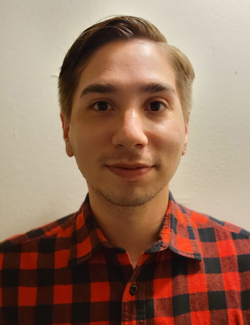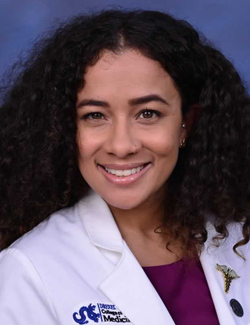
David Marulanda, MD Program Class of 2024
March 13, 2022
By Lisa Ryan
Prior to the recent 2022 Latino Medical Student Association (LMSA) National Conference, which Drexel University College of Medicine sponsored and co-hosted, former LMSA co-presidents David Marulanda, MD Program Class of 2024, and Edeline Sanchez, MS, MD Program Class of 2024, provided insight into their paths to becoming physicians and the organization.
College of Medicine (COM): Please tell me about yourself, and what drew you to medical school.
David Marulanda (DM): I am a first-generation Colombian American from New York City. I’m also one of the few students at the College of Medicine who is over 30, because I had no desire to pursue medicine when I was in college. I had loved science and medicine ever since I was a kid watching The Magic School Bus, and after some years out of college, I decided to go back to school and study something I would enjoy. I also wanted to make a difference. I had seen how difficult it was for family members, myself and friends to get decent medical care in this country, not to mention how much harder it was when those family members and friends either didn't speak English or were undocumented.

Edeline Sanchez, MS, MD Program Class of 2024
Edeline Sanchez (ES): My grandparents immigrated from the Dominican Republic about 50 years ago, so I identify as a second-generation Afro-Latina. I was raised in a single-mother household in the Upper West Side of New York City, where there is a large immigrant population. Growing up, I never saw anyone who looked like me practicing medicine, but I knew once I entered college and became a public health major that medicine was the right career for me. Learning about health disparities, especially those that impact Hispanic and Latinx populations, fueled my passion to pursue medicine. It’s been a tough journey but I’m so proud of how far I’ve come!
COM: What made you want to join LMSA? How has LMSA helped shape your medical school experience?
DM: Coming from New York City where I was used to seeing Latino people everywhere I turned, I was missing a sense of community when I arrived here. The LMSA helped me feel welcome and it gave me an opportunity to build community with likeminded students and faculty on campus. It also gave me a place from which to help the Latino community through fundraisers for charity, phone banking for vaccination reminders, community health fairs, and through other projects over the last two years.
ES: I knew coming into medical school that if I joined LMSA I could channel my passion for mentorship and community outreach while working alongside peers who looked like me and with an amazing group of faculty members from the College of Medicine. As a Latina in medical school, I also wanted to make sure that I was immersing myself in spaces where I felt safe and comfortable while celebrating the culture that I am so proud of. Being part of LMSA for the last two years has been truly phenomenal. I have been able to organize events around topics that I truly care about and have gotten to celebrate and highlight Latinx culture at the College of Medicine.
COM: What is your current role with LMSA, and what does it entail? What past roles have you held with LMSA, and what have they entailed?
DM: My current role with the LMSA is an unofficial one. I served as co-president for the last year, and for part of my first year in medical school, I was the Diversity Liaison. It was a bittersweet moment when I had to select a new group of board members, because being a part of the LMSA has been my favorite part of medical school – that is why I asked the current board to allow me to stay involved in some capacity. I don't have a title, but I'm still able to provide my experience and help the current board in their work, and that is what’s most important to me.
For the LMSA National Conference, I also served as a National Conference Chair. In that role, I was very much focused on increasing Latino representation in medical schools and the physician workforce. One of my goals as the Conference Chair was to focus on the next generation of medical providers by targeting pre-medical students with our advertising.
ES: I became involved in LMSA as soon as I began my College of Medicine journey. I began as a PR/Marketing Liaison creating flyers for events, then in January of 2021 was elected co-president of the chapter. As co-president, I coordinated and supported team efforts, lead the rest of the board with goal-oriented tasks, and planned events that celebrated Latinx communities at the College of Medicine and in Philadelphia. My favorite events under my and David’s leadership were Salsa Night during this past Hispanic Heritage Month, and a discussion we held over Zoom last year on Afro-Latinidad and anti-Blackness.
We just transitioned E-board positions, so I am no longer a co-president, but I intend to stay involved with the chapter. I also served on the Social Sub-Committee for the National Conference.
COM: What were you most looking forward to ahead of the LMSA conference?
DM: I was looking forward to a year's worth of work coming to fruition! Joking aside, I was really excited to see what 50 years of LMSA would look like. I couldn’t wait to meet LMSA members from the last five decades.
ES: I was most looking forward to networking with medical students and physicians from the nearby medical schools – Jefferson, Temple, UPenn and PCOM. I was also excited to highlight the College of Medicine and the unique features that make it a wonderful medical school.
COM: What was your chapter's role in the conference when COM was one of the hosting institutions? What work did you do as part of the conference?
DM: Our role in the conference was to represent the best of the College of Medicine and Philadelphia. Being a host was an honor and responsibility that we, as students and representatives, got to enjoy. As the LMSA National Conference Chair I worked to not just prepare for the conference but also to help create it, from recruiting speakers and attendees to creating an agenda and working with a $200k+ budget.
ES: As a part of the Social Sub-Committee for the National Conference, I had the chance to work with medical students from Temple and UPenn to plan fun events that took place during the conference. These events included a gala, as well as a networking event at The Mütter Museum.
COM: Tell me more about the new undergraduate LMSA chapter and your work with them.
DM: The undergraduate arm of the LMSA is called LMSA+. It is a relatively new LMSA initiative to increase diversity in the physician workforce. At the College of Medicine, we felt it was necessary to create an LMSA+ chapter to provide mentorship to the next generation of medical providers as well increase the number of Latino physicians in the future.
ES: One of my main goals when becoming Co-President of LMSA was to establish an LMSA+ chapter at the Drexel undergraduate campus. I remember being a pre-med student and having to figure things out on my own or not having a mentor to guide me along the way. I hope that LMSA members can serve as mentors and be resources for the undergraduate students at Drexel. I also hope that in the upcoming years, we can continue to foster a relationship with the LMSA+ chapter and have MCAT Prep, application review and help them with their journey to medical school.
COM: How will your time in LMSA help you as you move forward in your medical career?
DM: My time with the LMSA has been an invaluable addition to my career. I have learned about every aspect of medicine through LMSA. I've learned about academic medicine, policy, mentorship, clinical skills, teamwork, culturally sensitive care, conference planning, leadership and probably a dozen other things I can't recall now.
ES: Serving as co-president of LMSA for the last year has taught me valuable leadership skills such as delegating tasks, managing meetings, organization and so much more. It also allowed me to network and connect with other Latinx medical students and get to know the faculty at the Office of Diversity, Equity & Inclusion better than I did before. As I continue to medical school career, I hope to continue to be a leader and use my voice to advocate for patients.